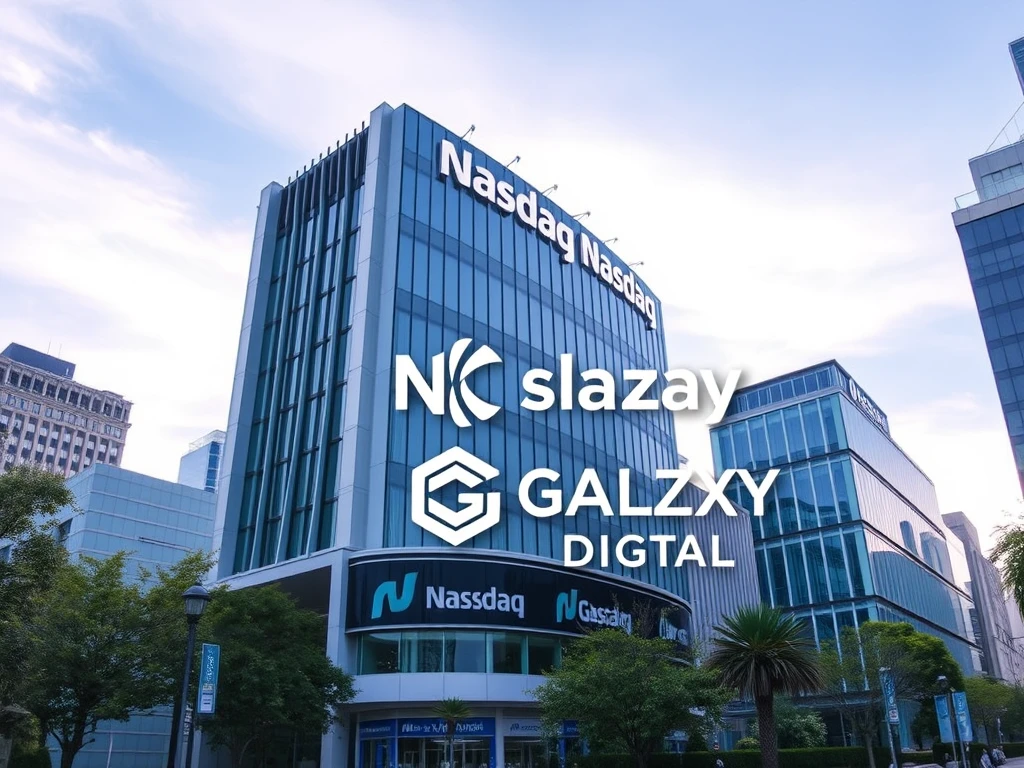Galaxy Digital Achieves Nasdaq Listing, Eyes Groundbreaking Tokenization Plans

In a significant move for the cryptocurrency sector, Galaxy Digital has successfully listed its shares on the Nasdaq stock exchange. This development marks a pivotal moment for the crypto and infrastructure company, culminating a process described by CEO Mike Novogratz as challenging. Alongside the listing, Galaxy Digital is reportedly exploring innovative Tokenization strategies for its shares, signaling potential shifts in how traditional assets interact with blockchain technology.
Galaxy Digital’s Journey to Nasdaq
The long-awaited Nasdaq debut for Galaxy Digital finally occurred on May 16. The company, already listed in Canada, began trading on the major US exchange with an opening price of $23.50. This Crypto Listing follows a considerable effort, highlighting the hurdles crypto-native firms face when seeking access to established US financial markets.
Despite this milestone, Galaxy Digital faced financial headwinds in the first quarter of 2025, reporting a net loss of $295 million according to investor reports. This financial performance provides context to the company’s strategic moves, including expanding its market presence through the Nasdaq listing and exploring new revenue streams via Tokenization.
Exploring Share Tokenization: What Does It Mean?
Simultaneously with its Nasdaq listing, Galaxy Digital disclosed that it is in discussions with the US Securities and Exchange Commission (SEC) regarding the potential Tokenization of its shares. This initiative could see tokens representing Galaxy Digital’s stock utilized within decentralized finance (DeFi) applications, potentially enabling activities like borrowing and lending against these digital assets.
Share Tokenization is part of the broader trend known as Real-World Asset (RWA) Tokenization, which involves representing tangible or traditional financial assets on a blockchain. While still a relatively small segment compared to global asset values or major cryptocurrencies, the RWA sector is experiencing rapid growth, showing a 111.8% increase over the past year and reaching a market capitalization of $22.5 billion, according to data from RWA.xyz.
The Growing Trend of Real-World Asset (RWA) Tokenization
The concept of tokenizing securities, transforming assets like stocks and bonds into tradable tokens on the blockchain, is gaining significant traction. This trend suggests a potential future where traditional financial markets and blockchain technology become more integrated.
Several examples illustrate this trend:
- Galaxy Digital‘s reported plans to tokenize a range of assets, including stocks, fixed income, and ETFs.
- Trading platform Robinhood is reportedly considering building a blockchain specifically for European retail investors to trade tokenized US securities.
The potential benefits of RWA Tokenization are often compared to the music industry’s shift from analog to digital, a transition that SEC Chair Paul Atkins referenced positively at a recent crypto roundtable, highlighting its economic benefits.
A Shifting Landscape for Crypto Listings in the US
Galaxy Digital‘s Nasdaq Crypto Listing occurs within a period of increased optimism and activity for crypto companies seeking access to the US market. A potentially friendlier regulatory environment is encouraging several firms to explore or pursue US listings.
Other notable companies reportedly considering or working on a US Crypto Listing include:
- Metaplanet
- Circle
- Kraken
- Gemini
This wave of activity follows recent developments, such as eToro completing its listing on May 14. The renewed interest in the US market is partly attributed to evolving political dynamics and increased engagement between US policymakers and the crypto industry.
Conclusion: Galaxy Digital’s Bold Steps
Galaxy Digital‘s successful Nasdaq Crypto Listing is a significant corporate achievement, opening the company to a wider pool of US investors. Coupled with ambitious plans for share Tokenization, Galaxy Digital is positioning itself at the intersection of traditional finance and emerging blockchain capabilities. While challenges remain, as evidenced by recent financial results, these strategic moves highlight the company’s commitment to innovation and its belief in the future integration of RWA on the blockchain. This development is a key indicator of the growing maturity and ambition within the crypto industry as it seeks broader acceptance and utility.










